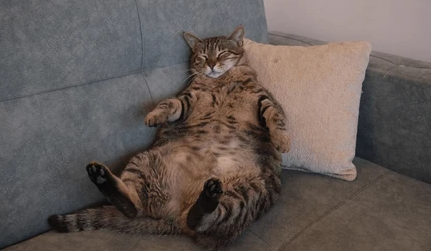Pet obesity is on the rise in the United States, with about 60% of dogs and cats now considered overweight. The health consequences are serious — from reduced life expectancy to costly medical conditions — and many pet owners are struggling to find effective solutions.
Now, pharmaceutical researchers are looking to a surprising source for help: weight-loss medications originally developed for humans. A new drug being touted as ‘Ozempic for dogs and cats’ could mark a major turning point in the fight against pet obesity.
The treatment, developed by biotech firm Okava in partnership with Vivani Medical, uses exenatide — a compound that mimics the GLP-1 hormone to reduce appetite and improve satiety. Similar to the mechanism behind human drugs like Wegovy and Zepbound, this pet-focused version comes as an implant called OKV-119, which steadily releases the medication over a six-month period.
Unlike traditional injectable medications, this device is roughly the size of a tracking chip and does not require daily administration. “OKV-119 mimics many of the physiological effects of fasting … without requiring significant changes in feeding routines,” said Okava CEO Michael Klotsman.
Early studies on cats have shown promising results, with participants losing at least 5% of their body weight in just under four months. Clinical trials are now expanding to include dogs, and a commercial rollout could happen as early as 2028 or 2029.
The introduction of the drug comes at a critical time. In 2022 alone, 100 million pets were classified as overweight or obese — a dramatic increase from 80 million just five years prior, according to the Association for Pet Obesity Prevention.
Veterinarians often recommend caloric restriction or increased physical activity to manage weight in pets, but these methods can be difficult to maintain. Many owners struggle to limit treats or resist persistent begging behaviors. “They’ll still eat regularly and show interest in meals, just without the excessive begging,” Klotsman explained.
The health implications are significant. Overweight dogs can live up to 2.5 years less than their healthy-weight counterparts, while overweight cats face a nearly threefold increase in mortality between the ages of 8 and 12.
For pet owners looking for more effective tools, ‘Ozempic for dogs and cats’ could fill an important gap. “It offers an additional option for pets where conventional approaches have not worked — much like how GLP-1 therapies have changed the game for human patients,” Klotsman added.
Pet health is becoming an increasingly high priority for Americans. A recent poll found that over half of dog owners rank their pet’s health equal to their own, while more than 40% consider it even more important.
And the benefits go both ways. Pet ownership has been linked to improved cardiovascular health, reduced stress and anxiety, and greater overall longevity for humans.
Need more weird news? Click here.

